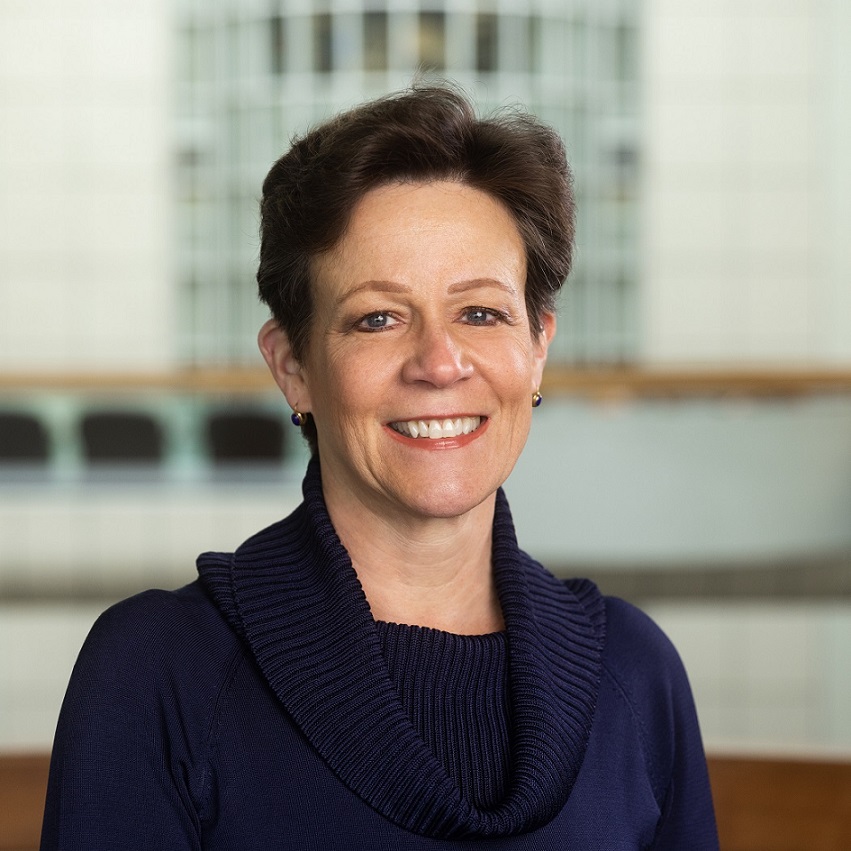 Donna Blackmond, Scripps Research, United States
Donna Blackmond, Scripps Research, United States
Donna G Blackmond received a PhD in Chemical Engineering from Carnegie-Mellon University. She has held professorships in chemistry and in chemicalengineering in the US (University of Pittsburgh), Germany (Max-Planck-Institut für Kohlenforschung), and the UK (University of Hull; Imperial College London), and she has worked in the pharmaceutical industry (Merck). She is Professor of Chemistry, Department Chair, and the John C. Martin Endowed Chair in Chemistry at Scripps Research, La Jolla, California. She holds joint US/UK citizenship.
Prof. Blackmond is an elected member of the US National Academy of Sciences, the US National Academy of Engineering, the American Academy of Arts and Sciences, the German Academy of Sciences Leopoldina, and she is a Fellow of the Royal Society of Chemistry. She has been recognized internationally for her research including the Wolfson Research Merit Award from the Royal Society, the Max-Planck-Gesellschaft Award for Outstanding Women Scientists, the Arthur C. Cope Scholar Award from the American Chemical Society, and the IUPAC Award for Distinguished Women in Chemistry or Chemical Engineering. She has been a Woodward Visiting Scholar at Harvard, a Miller Institute Research Fellow at Berkeley, and a NSF Visiting Professor at Princeton. Among other named lectureships, she has been the Merck Distinguished Lecturer at MIT, the Paul Gassmann Lecturer at the University of Minnesota, the Givaudan-Karrer Lecturer at University of Zürich, the 8th Anton Vilsmeier Lecturer at the Universität Regensburg, the Lemieux Lecturer at University of Ottawa, the Laird Lecturer at the University of British Columbia, and the Gordon Lecturer at the University of Toronto. In 2021 she received a Humboldt-Forschungspreis from the Alexander von Humboldt Foundation.
Prof. Blackmond’s research focuses on mechanistic studies of organic reactions, including asymmetric catalysis. She pioneered the methodology of “Reaction Progress Kinetic Analysis (RPKA)” for fundamental mechanistic studies of complex organic reactions as well as for streamlining pharmaceutical process research. Prof.Blackmond is a Simons Investigator in the Simons Foundation Collaboration on the Origins of Life where she studies prebiotic chemistry and the origin of biological homochirality. She has been invited by the Swedish Academy of Sciences to speak at two Nobel Workshops, “On the Origin of Life” (2006) and “Chiral Matter” (2021).
 Benjamin Davis, University of Oxford, United Kingdom
Benjamin Davis, University of Oxford, United Kingdom
Ben Davis got his B.A. (1993) and D.Phil. (1996) from the University of Oxford. During this time he learnt the beauty of carbohydrate chemistry under the supervision of Professor George Fleet. He then spent 2 years as a postdoctoral fellow in the laboratory of Professor Bryan Jones at the University of Toronto, exploring protein chemistry and biocatalysis.
In 1998 he returned to the U.K. to take up a lectureship at the University of Durham. In the autumn of 2001 he moved to the Dyson Perrins Laboratory, University of Oxford and received a fellowship at Pembroke College, Oxford. He was promoted to Full Professor in 2005. In late 2019 he became the Science Director for Next Generation Chemistry at the Rosalind Franklin Institute.
His group's research centres on the chemical understanding and exploitation of biomolecular function (Synthetic Biology, Chemical Biology and Chemical Medicine), with an emphasis on carbohydrates and proteins. In particular, the group's interests encompass synthesis and methodology; target biomolecule synthesis; inhibitor/probe/substrate design; biocatalysis; enzyme & biomolecule mechanism; biosynthetic pathway determination; protein engineering; drug delivery; molecular biology; structural biology; cell biology; glycobiology; molecular imaging and in vivo biology.
Ben Davis was/is co-founder of Glycoform, a biotechnology company that from 2002-2011 investigated the therapeutic potential of synthetic glycoproteins; of Oxford Contrast a company investigating the use of molecular imaging for brain disease; of SugaROx a company that uses bond-breaking methods in planta to control and stimulate plant growth and productivity and of Scindo, a cleantech company started by former DPhil student Gustaf Hemberg that is harnessing the power of enzymes to recycle the unrecyclables. In 2003 he was named among the top young innovators in the world by Technology Review, the Massachusetts Institute of Technology (MIT)'s magazine of innovation in the TR35 awards and was a finalist in the BBSRC Innovator of the Year competition in 2010.
He was elected to the Royal Society in 2015.
 Ross Denton, University of Nottingham, United Kingdom
Ross Denton, University of Nottingham, United Kingdom
Ross began his research career at The University of Nottingham, carrying out his PhD studies with Professor Jim Anderson. Following the completion of his doctoral research he moved to The Scripps Research Institute in California as a postdoctoral fellow in the group of Professor K.C. Nicolaou. Returning to the UK he carried out further postdoctoral studies with Professor Steven Ley, CBE, FRS at Cambridge University. He returned to Nottingham to begin his independent research career in 2008 as a fixed term Lecturer in Organic Chemistry. In 2009 he was appointed to a Lectureship in Organic Chemistry. He was promoted to Associate Professor in 2016 and to Professor in 2020. His research interests invovle the design and development of new synthesis methods based on organophosphorus and organosilicon chemistry and their application in target synthesis. He was the recipient of the 2020 SCI Process Chemistry Award and the 2022 RSC Bader Prize.
 Alois Fürstner, Max-Planck-Institut für Kohlenforschung, Germany
Alois Fürstner, Max-Planck-Institut für Kohlenforschung, Germany
Alois Fürstner is a native of Austria and obtained his doctoral degree from the Technical University of Graz (Prof. H. Weidmann). After a postdoctoral stint with the late Prof. Oppolzer at the University of Geneva, Switzerland, and completion of his Habilitation in Graz, he joined the Max-Planck-Institut für Kohlenforschung in Mülheim, Germany, in 1993 as a group leader. In 1998, he got promoted to the rank of Director and served two terms as the Managing Director.
His research interests in the area of organometallic chemistry and homogeneous catalysis range from the characterization of reactive intermediates and method development to applications in natural product total synthesis.
His honors include the inaugural Mukaiyama Award (Japan), a Centenary Lectureship (RSC), the Arthur C. Cope Scholar Award (ACS), the Janssen Prize for Creativity in Organic Synthesis, the Prelog Medal (ETH Zürich), the Karl Ziegler Prize (GdCH), the Gay Lussac/Humboldt Prize (France), the H. C. Brown Award for Creative Research in Synthetic Methods (ACS), and the Prix Mondial Nessim Habif (Switzerland). He is member of the German National Academy “Leopoldina”.
 Syuzanna Harutyunyan, University of Groningen, Netherlands
Syuzanna Harutyunyan, University of Groningen, Netherlands
Syuzanna is originally from Armenia, where she received her Master’s degree in Pharmacology. She did her PhD in Moscow with Prof. Belokon and was a postdoctoral fellow in Groningen with Prof. Feringa. Following her stay at Janssen Pharmaceutica, Syuzanna returned to the University of Groningen in 2010 to start her independent career and since 2018 she is a Full Professor and Chair of Homogeneous Catalysis.
Syuzanna’s research is in the field of homogeneous catalysis, out of equilibrium systems and reaction mechanisms. Her scientific prowess has been recognized by awards such as the Solvias Ligand Contest Award, the KNCV Gold Medal from Dutch Royal Society, the Royal Chemical Society Homogeneous Catalysis Award as well as ERC consolidator grant. Harutyunyan serves as an associate editor for ACS Catalysis.
 Xiaoguang Lei, Peking University Beijing, China
Xiaoguang Lei, Peking University Beijing, China
Prof. Xiaoguang Lei obtained BS in chemistry from Peking University in 2001, and a Ph.D. in organic synthesis from Boston University under the supervision of Prof. John Porco in 2006. Then he conducted postdoc work in bioorganic chemistry with Prof. Samuel Danishefsky at Columbia University from 2006 to 2008. In early 2009, he returned to China and started his independent career as a Principal Investigator and Director of the Chemistry Center at the National Institute of Biological Sciences (NIBS) in Beijing. In early 2014, he received a tenured professorship from Peking University and moved to the College of Chemistry at Peking University. Now he is the Boya Distinguished Professor of Chemistry and Chemical Biology, and he is also a senior PI of the Peking-Tsinghua Center for Life Sciences. His major research areas are natural product total synthesis, biosynthesis, chemical biology, and drug discovery. He has developed four “first-in-class” drug candidates, and one of them has started Phase I clinical trials in USA and China since 2021. He has received many prestigious awards including the 2022 Molecules Tu Youyou Award, the 2022 Xplore Prize, the 2021 Boehringer-Ingelheim Senior Investigator Award, the 2020 Bayer Investigator Award, the 2018 David Ginsburg Award in Israel, the 2017 Tetrahedron Young Investigator Award, the 2017 Swiss Chemical Society Distinguished Lectureship Award, the 2015 Chemical Society of Japan Distinguished Lectureship Award, the 2014 Roche Young Investigator Award, the 2013 International Chemical Biology Society (ICBS) Young Chemical Biologist Award, the 2013 Servier Young Investigator Award in Medicinal Chemistry, and the 2010 IUPAC Young Chemist Award, etc. Since 2017 he has served as an editor for Bioorganic & Medicinal Chemistry.
 Alastair Lennox, University of Bristol, United Kingdom
Alastair Lennox, University of Bristol, United Kingdom
Alastair Lennox attained his PhD from the University of Bristol under the supervision of Prof Guy Lloyd-Jones. After a short time in industry, Alastair moved to the Leibniz Institute for Catalysis in Rostock to work with Prof Matthias Beller with an Alexander von Humboldt Fellowship, before moving to University of Wisconsin-Madison for further postdoctoral research with Prof Shannon Stahl. In 2018, Alastair returned to the UK with a Royal Society University Research Fellowship to start his own research programme at the University of Bristol. His group are interested in the development of novel synthetic methods with a strong emphasis on sustainability.
 Ilan Marek, Technion – Israel Institute of Technology, Israel
Ilan Marek, Technion – Israel Institute of Technology, Israel
Ilan Marek received his PhD in 1986 from the University Pierre et Marie Curie, Paris, France under the supervision of Prof. Jean Normant. Following post-doctoral studies at the University Catholique de Louvain, Belgium with Prof. Leon Ghosez, backed to Paris he joined the CNRS in 1989. In 1997, he moved to the Technion – Israel Institute of Technology and currently holds the Sir Michael and Lady Sobell Academic Chair. Professor Marek’s honors include the RSC Organometallic Awards (2012), Israel Chemical Society Excellence Award (2012), Janssen Pharmaceutica Prize for Creativity in Organic Synthesis (2012), the Moore Distinguished Scholar Appointment from CalTech (2013), The Weizmann Prize for Exact Sciences (2015), The Yannai Award for Excellence in Teaching (2016), the Arthur C. Cope Scholar Award by the ACS (2021). In 2017, he was elected Member of the French Academy of Sciences and in 2019, Member of the Israel Academy of Sciences and Humanities.
 Takashi Ooi, Nagoya University, Japan
Takashi Ooi, Nagoya University, Japan
Takashi Ooi received his Ph.D. from Nagoya University (1994, Prof. Hisashi Yamamoto). After his postdoctoral study at MIT (Prof. Julius Rebek, Jr.), he was appointed as an assistant professor at Hokkaido University in 1995 and promoted to a lecturer (1998). He moved to Kyoto University as an associate professor (2001), and became a full professor of Nagoya University in 2006. Since 2013, he has been a professor of Institute of Transformative Bio-Molecules (ITbM), Nagoya University. Research in his group is mainly focused on the molecular design and precise structural control of chiral organic molecular catalysts, particularly ion-pair catalysts, for selective organic synthesis.
 Emma Parmee, Janssen Pharmaceuticals, United States
Emma Parmee, Janssen Pharmaceuticals, United States
As Global Head of Therapeutics Discovery within Janssen Research & Development, Emma Parmee is currently responsible for execution of the discovery portfolio and delivery of development candidates across all therapeutic modalities including small molecules, biologics, peptides, and RNA, gene, and cell therapies.
Emma joined Janssen in November 2020 following a 28-year career at Merck Research Labs (MRL), most recently serving as Head of Discovery Chemistry. She began at MRL in the cardiometabolic area where she was privileged to work on the DPP-4 inhibitor project and contribute to the discovery of JANUVIA™ (sitagliptin) for the treatment of type 2 diabetes. Emma also served as a Discovery Chemistry Site Lead, responsible for chemistry efforts in Neuroscience, HIV, and Bone. During this time the small molecule CGRP antagonists, UBRELVY™ (ubrogepant) and QULIPTA™ (atogepant), were delivered from the group.
Emma obtained her D. Phil. Degree in 1990 at the University of Oxford, studying the total synthesis of milbemycin natural products and then completed a NATO postdoctoral fellowship at MIT under Professor Satoru Masamune.
Emma was awarded the Thomas Alva Edison Patent Award from the R&D Council of NJ in 2007 and the SCI Gordon E. Moore Medal for Innovation in 2009, both for her contributions toward the discovery of JANUVIA™. She is also a member of the Merck team awarded the 2007 Prix Galien USA for the discovery of JANUVIA™. Emma was the recipient of the 2018 ACS Medicinal Chemistry Division Award and was inducted into the ACS Division of Medicinal Chemistry Hall of Fame in 2018. In 2022, Emma received an Arthur C. Cope Scholar award from the American Chemical Society (ACS). Her work has led to more than 40 issued US patents and more than 50 publications in peer-reviewed journals.
 David Procter, University of Manchester, United Kingdom
David Procter, University of Manchester, United Kingdom
David John Procter was born in Leyland in Lancashire, England. He obtained his BSc in Chemistry from the University of Leeds in 1992 and his PhD in 1995 working with Professor C. M. Rayner. He then spent two years as a Postdoctoral Research Associate with Professor Robert Holton at Florida State University in Tallahassee, USA working on the synthesis of analogues of the anticancer agent Taxol. In late 1997 he took up a Lectureship at the University of Glasgow in Scotland and was promoted to Senior Lecturer in February 2004. In September 2004, he moved to a Readership at the University of Manchester. David was promoted to Professor in October 2008, has served as Head of Organic Chemistry, and is currently Head of Department.
In addition to the 2020 RSC Charles Rees Award, David has received an EPSRC Established Career Fellowship (2015-2020), the 2014 Liebig Lectureship from the German Chemical Society, the 2014 Bader Prize from the Royal Society of Chemistry, and a Leverhulme Trust Research Fellowship (2013). David’s interests include radical chemistry, organosulfur chemistry, catalysis, total synthesis, and photochemistry/photocatalysis.
 Angela Russell, University of Oxford, United Kingdom
Angela Russell, University of Oxford, United Kingdom
Angela is a Professor of Medicinal Chemistry jointly between the Departments of Chemistry and Pharmacology at the University of Oxford. She gained her DPhil in Organic Chemistry in 2004, and in 2007 she was awarded a Research Councils’ UK Fellowship. Her research concerns the discovery and translation of new molecules and mechanisms to manipulate cell fate, particularly for degenerative diseases.
 Ryan Shenvi, The Scripps Research Institute, California, United States
Ryan Shenvi, The Scripps Research Institute, California, United States
Ryan Shenvi is a Full Professor at Scripps Research in La Jolla, CA. He was born in Wilmington, Delaware and earned his BS with honors and distinction in chemistry as a Schreyer’s Scholar at Penn State University, where he conducted research with John Desjarlais and Raymond Funk. Ryan earned his Ph.D. in 2008 from The Scripps Research Institute as an NDSEG Fellow under the supervision of Phil S. Baran, and undertook postdoctoral studies as a Ruth L. Kirschstein NIH Postdoctoral Fellow with E. J. Corey at Harvard University. He started his independent career at The Scripps Research Institute, La Jolla in 2010 and was tenured in 2014. His laboratory works at the interface of catalysis, complex molecule synthesis and structural biology. He was the recipient of the 2021 ACS E.J. Corey Award, a 2020 Blavatnik Finalist Award in Chemistry and the 2019 Tetrahedron Young Investigator Award. He serves as Advisory Editor on the Angewandte Chemie Scientific Advisory Board, Executive Editor at the Encyclopedia of Reagents for Organic Synthesis and as a member of the Editorial Advisory Board for ACS Central Science and Accounts of Chemical Research.
 Ruth Webster, University of Bath, United Kingdom
Ruth Webster, University of Bath, United Kingdom
Ruth Webster obtained her MSci from the University of Strathclyde and her PhD from the University of Bristol (2011, Professor Robin Bedford). Following a Commonwealth Postdoctoral Fellowship at the University of British Columbia with Professor Laurel Schafer, Ruth returned to the UK in 2012 where she is currently an EPSRC Early Career Fellow in Catalysis at the University of Bath.
 Omar Yaghi, University of California, Berkeley, United States
Omar Yaghi, University of California, Berkeley, United States
Omar M. Yaghi obtained his B.S. in chemistry from University of New York-Albany (1985) and his Ph.D. in chemistry from the University of Illinois-Urbana (1990). He was an NSF Postdoctoral Fellow at Harvard University (1990-1992). He held professorial positions at Arizona State University (1992-1999), University of Michigan (2000-2006) and UCLA (2007-2011). Since 2012, he has been the James and Neeltje Tretter Chair Professor of Chemistry at the University of California, Berkeley. He is also the Founding Director of the Berkeley Global Science Institute whose mission is to build centers of research in developing countries and provide opportunities for young scholars to discover and learn, the Co-Director of the Kavli Energy NanoSciences Institute focusing on the basic science of energy transformation on the molecular level, the Co-Director of the California Research Alliance by BASF supporting joint academia-industry innovations, and the Bakar Institute of Digital Materials for the Planet whose mission is integrate artificial intelligence and data science into the basic sciences to solve climate issues and scale solutions globally. His research work led to over 325 published articles, which have received a total of more than 210,000 citations (December 2022). He has an h-index of 176 and ranked as one of the most impactful chemists worldwide
Yaghi is an elected member of the U.S. National Academy of Sciences (2019), American Academy of Arts and Sciences (2022), and the German National Academy of Sciences Leopoldina (2022). He has also been honored with many awards from sixteen countries. A selected list includes: Sacconi Medal of the Italian Chemical Society (2004), Materials Research Society Medal (2007), American Chemical Society Award in the Chemistry of Materials (2009), Royal Society of Chemistry Centenary Prize (2010), King Faisal International Prize in Science (2015), Albert Einstein World Award of Science (2017), BBVA Foundation Frontiers of Knowledge Award in Basic Sciences (2017), Wolf Prize in Chemistry (2018), Eni Award for Excellence in Energy (2018), Aminoff Prize by the Royal Swedish Academy of Sciences (2019), August-Wilhelm-von-Hofmann-Denkmünze Prize of the German Chemical Society (2020), Royal Society of Chemistry Sustainable Water Award (2020), Belgium’s International Solvay Chair in Chemistry (2021), VinFuture Prize for Emerging Science and Technology (2021), and the Wilhelm Exner Medal (2023).
-
Tanja Gaich
University of Konstanz, Germany
-
Rubén Martin
Institute of Chemical Research of Catalonia , Spain




































